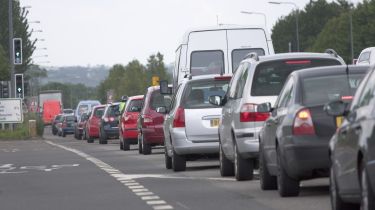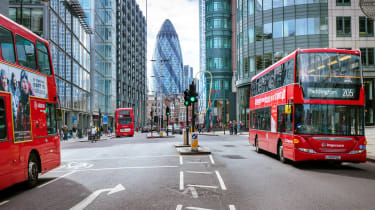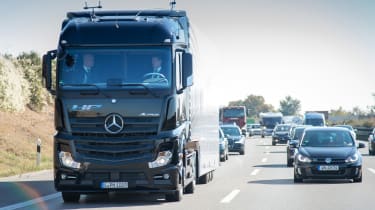Clean Air Zones: Oxford ZEZ pilot goes live
Pilot scheme sees internal combustion engined vehicles charged between £2 and £10 per day to drive in Oxford city centre

Oxford's Zero Emission Zone has begun its pilot phase, the city council has announced.
The 'ZEZ Pilot' covers a relatively small number of streets within Oxford city centre at launch, but will expand to cover most of the city should the trial run be deemed a success.
In the ZEZ pilot zone, drivers of internal combustion engined vehicles entering between 7am and 7pm, 365 days a year, will be required to pay a fee. The charge will be £2 per day for hybrids emitting less than 75g/km CO2, £4 for Euro 4 petrol and Euro 6 diesel vehicles, and £10 for pre-Euro 4 petrol and pre-Euro 6 diesel vehicles. Fully electric vehicles are exempt from charges.
The prices could rise if the scheme is permanently implemented, however, to £4 for hybrids emitting less than 75g/km CO2, £8 for Euro 4 petrol and Euro 6 diesel vehicles, and £20 for pre-Euro 4 petrol and pre-Euro 6 diesel vehicles. There will not be any charge for zero emission vehicles, such as electric cars.
Exemptions will be available for health and care workers, students with financial hardship who need to enter the zone and Blue Badge holders, while residents and businesses within the zone will be able to apply for a 90 per cent discount. There will also be a 50 per cent discount for private hire vehicles.
Birmingham Clean Air Zone
Birmingham's Clean Air Zone went live in June 2021, based on a similar model to the London ULEZ (Ultra-Low Emission Zone).
Anyone driving a pre-Euro 4 petrol or pre-Euro 6 diesel car within the limits of the A4540 Middleway Ring Road in the UK's second-largest city will be charged a daily fee of £8.
Like the London ULEZ, the fee is payable online, it’s enforced by ANPR (automatic number plate recognition cameras), and operates 24 hours per day, 365 days per year.
Vans and buses that transport school children or provide community services are exempt, as are vehicles in a disability tax class. Non-compliant HGVs have to pay a fee of £50.
Bath Clean Air Zone
Bath's Clean Air Zone went live on 15 March 2021. Private cars are exempt, but non-compliant taxis and vans are charged £9 per day, while polluting buses and lorries pay £100.
Bath and North East Somerset Council offers financial support to eligible firms that want help upgrading their vehicle fleets in order to be compliant.
Bristol diesel ban scrapped
Bristol has cancelled plans to ban diesel cars from a small area of its city centre and implement a Clean Air Zone.
The city's mayor announced that the council is instead hoping to draw up new clean air plans for the area that don't involve charging individuals or businesses.
The abandoned plans would have seen Bristol become the first UK city to implement any sort of outright ban on diesel cars, had the scheme been implemented in 2021 as originally intended. All diesel cars would have been banned from a small area of the city centre between 7am and 3pm.
Plans for a Clean Air Zone over a wider area of the city have also been scrapped. This would only have affected diesel-powered lorries, vans, buses and taxis, which would have been made to pay a fee. Taxis and vans would have been charged £9 per day, while HGV operators would had to have paid £100.
Leeds delays Clean Air Zone plans indefinitely
Plans to implement a Clean Air Zone in Leeds have been suspended for the foreseeable future due to coronavirus.
The scheme - which was meant to be implemented earlier this year but has faced numerous delays - has been torpedoed by expectations that air quality improvements that have occurred during the coronavirus pandemic could result in the Government withdrawing funding for new Clean Air Zones.
Leeds City Council now says it hopes to review the status of the scheme in the Autumn. A camera network costing £6 million has already been installed in the city to enforce the zone.
The Clean Air Zone wasn't set to affect privately owned cars, instead applying only to HGVs, buses, coaches and taxis classed as having high emissions. Non-compliant vehicles would be subject to a daily charge of between £12.50 and £50 depending on category.
Other Clean Air Zones
The full list of planned Clean Air Zones can be found here:
Aberdeen
Aberdeen City Council is looking at options for a Low Emission Zone to be implemented in the city centre later this year.
Vehicles that do not meet the necessary criteria will be banned from entering the city centre altogether. The proposed minimum standards are Euro 6 for diesel cars, Euro 4 for petrol cars and Euro VI (roughly pre-2013) for heavy diesel-engined vehicles, such as HGVs and buses.
Bath
Having backpedalled on plans to introduce a Clean Air Zone that would have affected private cars, Bath and North East Somerset has implemented a scheme that only affects commercial vehicles.
It will see high-polluting buses, coaches and HGVs entering Bath city centre charged £100 a day, while non-Euro 6 diesel or non-Euro 4 petrol taxis, minibuses and vans will have to pay £9 a day.
Birmingham
Birmingham's Clean Air Zone is coming into force on 1 June 2021, with drivers of cars not meeting Euro 4 petrol or Euro 6 diesel emissions standards being charged to enter the area within the A4540 Middleway Ring Road. The zone will be active 24 hours a day, seven days a week.
Brighton
Brighton and Hove County Council has commissioned a report to look at the possibility of banning cars from its city centre by 2023. The report is due to be published in March and will take the needs of the disabled, as well as taxi drivers and traders, into consideration.
Cambridge
Cambridge City Council claims there are 106 deaths in Cambridge and South Cambridgeshire every year related to poor air quality. The council is devising plans for a Clean Air Zone, but has published no specific details yet.
Cardiff
Cardiff was planning to implement a Clean Air Zone in its city centre, but the plans were rejected amid claims the scheme would merely penalise owners of older cars. Instead, the council set out a number of measures to tackle NOx, such as fitting AdBlue systems to buses.
Derby
Derby City Council’s preferred option for dealing with air pollution in the city is a new traffic management system. However, the council still has two sets of plans on the table for potential Clean Air Zones.
The first would use the city’s inner ring road as its boundary and would charge non-Euro 4 petrol and non-Euro 6 diesel cars and vans - as well as high-polluting HGVs, buses and coaches - for entering the city centre.
The second scheme would cover a much larger area - right out to Derby’s outer ring road. The council has admitted though that the charges would affect “many people who could not afford to purchase a new vehicle or may be unable to change their travel choices”.
Dundee
Dundee City Council is consulting on plans to implement a Low Emission Zone within the boundary of the city’s inner ring road.
Petrol cars registered before 2006 and diesel cars registered before 31 August 2015, as well as older HGVs and LGVs, would be banned from the zone.
Edinburgh
Edinburgh is still consulting on its Low Emission Zone, with the council still deciding whether to have restrictions that apply to just the city centre for all vehicles or to the whole city but only for commercial vehicles.
Glasgow
Glasgow’s Low Emission Zone came into effect on 31 December 2018, initially only applying to local buses.
The scheme is still being phased in, though. On 31 December 2022, all vehicles entering the city centre zone will be required to meet the relevant standards - Euro 4 for petrol cars, and Euro 6 for diesel cars and any vehicles with heavy diesel engines.
Kent
Kent County Council’s opposition leader has indicated that vehicle tolling or outright car bans could be implemented in towns across Kent in the future. No specific plans have yet been published.
Leeds
The Clean Air Zone in Leeds was due to launch on 6 January 2020, but has been delayed indefinitely due to concerns over funding as a result of the coronavirus. Leeds City Council has been carrying out a review of the forthcoming scheme and says a decision is imminent.
London
London’s Ultra-Low Emission Zone (ULEZ) was the first Clean Air Zone of its kind in the UK when it was introduced in 2019. It’s in force 24 hours a day, seven days a week and currently covers central London’s Congestion Charge zone, although it will be expanded on 26 October 2021 to cover all of the city inside the North and South Circular Roads.

Pre-Euro 6 diesel cars built before around 2016 and pre-Euro 4 petrol cars built before 2006 are affected, having to pay £11.50 on top of the £12.50 daily Congestion Charge. Cars built before 1979 are exempt, though.
Non-Euro 3 motorcycles also have to pay, while non-Euro VI HGVs, buses and coaches are charged £100 a day.
Manchester
Manchester’s proposed Clean Air Zone will start being phased in this year, but it’s another scheme that wouldn’t affect private cars - just buses, coaches, HGVs, vans and taxis that are deemed to be high-polluting.
Newcastle
Following months of consultations, local authorities in Newcastle decided on a Clean Air Zone to implement. It’s set to come into force this year and won’t affect private cars for the time being.

Oxford
The first stage of Oxford's zero emission zone is going live in a small area of the city centre from August 2021, before expanding to cover most of the city in 2022. All internal combustion engined vehicles will face charges of up to £10 a day - depending on CO2 emissions - rising to as much as £20 in 2025.
Portsmouth
Portsmouth had plans for a Clean Air Zone covering the whole of Portsea Island, but scaled the scheme back to just the western side, excluding the city’s international port.
Reading
Reading is another city that has indicated it could implement a Clean Air Zone in the future, but has not released any exact details.
Sheffield
Sheffield City Council has previously discussed plans to introduce a Clean Air Zone within its inner ring road and city centre. The proposed scheme wouldn’t affect private cars - only HGVs, buses, vans and taxis that fail to meet emissions standards. Non-compliant vans and taxis will be charged £10 a day, while HGV and bus operators will be charged £50.
Slough
Slough’s plans for a potential Clean Air Zone are still being worked up, with specific details as yet unknown.
York
York wants buses that enter its city centre five or more times a day to meet ULEB (Ultra-Low Emission Bus) standards, meaning they have to be Euro 6 diesel, gas-powered or electric. City of York Council has also said it want to end "non-essential" travel by private cars within the city.
What are your thoughts on Bristol’s ‘Clean Air Plan?’ Let us know in the comments section below…
Find a car with the experts




